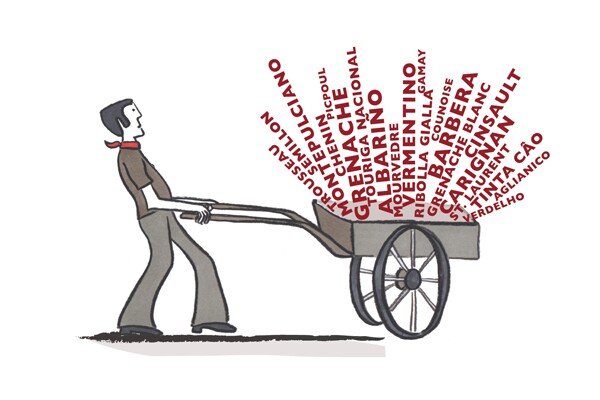California Wine: Putting the Variety in Varietals

Forget declaring ABC (that is Anything but Chardonnay or Anything but Cabernet), when you order your next glass of wine, try NBT (Nothing but Trousseau) or AIFA (All in for Aglianico) or PPTP (Please Pour the Picpoul). At least that's what a wine event in Healdsburg this weekend is hoping to convince people, as they make a push for what they call the 7% Solution. No, they aren't Sherlock Holmes or Nicholas Meyer fans. That figure attests to the fact that roughly 93% of North Coast Appellation vineyard acreage is planted to eight major grape varietals. The event on Saturday, May 11th at Bergamot Alley aims to point out many other wonderful, if far less known, varietals. Don't be afraid; for every Tinta Cao or Ribolla Gialla there's a less out-there Mourvedre or Albarino into which you may tip your tasting toe.
Bergamot Alley owner Kevin Wardell, who has worked as a sommelier at San Francisco mainstays flour + water and A16, claims he had great success with 7% solution varietals in his old job: "Wines like these have extraordinary appeal for a restaurant wine list in SF. Not just because they are unique, but because savvy consumers are more educated and exposed these days to a huge range of wines from around the world and are really enjoying exploring those same varietals grown locally."
Among the seventeen wineries pouring will be Idlewild Wines, run by Sam Bilbro and Jessica Boone Bilbro. They became seven-percenters for two main reasons. "First off, we love the wines of Piedmont (Arneis and more coming) and the Southern Rhone (Grenache Gris and more coming)," Sam explains. "We wanted to make what we loved, and we also felt as though these varietals should be more available in the new world. Secondly, we also love many other varietals including mainstream varietals like Pinot Noir, but from a sales stand point we couldn't foresee standing out with Pinot Noir. In other words, it was our point of differentiation to pursue the less common varietals that we love so much."
Many of the 7% grapes are far better known -- as much as they are known -- in Europe, but even there many are often considered more a blending grape (think Counoise or Cinsault) than something to focus on as a single wine. Still, it's no surprise that Wardell is behind this tasting. "Bergamot Alley does not serve California wines specifically because we like to celebrate the differences that exist between them and wines from Europe," he elaborates. "When we opened Bergamot it just seemed that doing so would be like bringing sand to the beach. A large part of our clientele is made up of winemakers, local and otherwise, and I can't tell you the amount of times I've been told 'I love that you have this wine on your list, I am really thinking of growing that varietal here!' We certainly feel like this event is right in our wheelhouse and a great opportunity for us to get involved with the local winemaking community celebrating just how different and wonderful wines can be."
And even the different wines can be yet more different, as Sam Bilbro of Idlewild makes clear: "We had never heard of anyone making Grenache Gris in any other way than pressed as a white, but we felt there was promise in a few practices which we combined to one. Several days of carbonic maceration lends a lifted blood orange and apricot fruit tone, then we foot tread the clusters and leave them on skins and stems for a few days which lends a savory almost Campari liqueur quality, and finally the wine finishes fermentation pressed off skins and stems at a cool temperature which protects the floral and delicate notes. It is unique for sure, but we think quite intriguing and tasty all at once."
The talent at the tasting is certainly impressive, led by Arnot-Roberts, who were named 2012 Winemakers of the Year by the San Francisco Chronicle. And it's not that these winemakers are merely out to be odd; certainly part of the issue is one that dominates all of farming, agricultural diversity. Admitting that's a complex topic, Wardell says, "The most important points have to do with the fact that people are seeking out wines that show varietal correctness and exhibit nuance of terroir. The consumer market pendulum is beginning to swing back towards wines with less oak and minimal manipulation by the winemakers. This really helps open the door for both winemakers and growers alike to break outside the bigger market grapes and showcase some truly great new flavor profiles grown here in our own soils and climates."
Wardell is perhaps most excited that "there's rumor of a barrel sample of my favorite grape in the world, Lacrima di Morro d'Alba, being brought as well -- a first in the U.S. as far as I know." And beyond the tasting, Bilbro asserts, "What is exciting to us is the thought of seeing this become a multi-city event with various new wineries coming in over time. I am sure there will be new wines that will be delightful and surprising along the way."
Here's to Southern California joining the 7% Solution soon too.